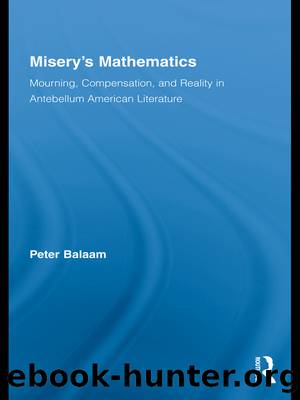Misery's Mathematics by Balaam Peter;

Author:Balaam, Peter;
Language: eng
Format: epub
Publisher: Taylor & Francis Group
Published: 2011-03-01T00:00:00+00:00
DOMESTICITYâS LIMITS: MOURNING âTHE GREAT SEPARATIONâ
Despite Warnerâs positive representation of the relating and ritualism Ellen and her mother enjoy in the domestic sphere, the emotional atmosphere of Mrs. Montgomeryâs home is also mined with remarkable ambivalence. For all the evident nurture and mutual understanding of the novelâs early domestic scenes, Warner reveals that such gains are sought and (temporarily) won in opposition not only to the masculine world of commerce and compromise outside, but to the indoor and even interior threats of the childâs fears of desertion and the motherâs isolation and secrecy. Begun in the very months of a controversy around Horace Bushnellâs Christian Nurture, The Wide, Wide World engages the domestic as embodying all the good that Cheever identifies according to the âvoice of nature,â but does so in order to reveal its inadequacy as a shelter from change and its incommensurability with the rougher goods she would have associated with âthe voice of grace.â
At issue in discussions of domesticity among Protestants in New York and New England in 1847 as Warner began to write was Bushnellâs controversial theory of domestic enculturation as the optimal route to Christian regeneration. Against revivalist conceptions of the nature of conversion as an adult individualâs sudden and violent overpowering and reorientation of the will, Bushnell proposed that âthe child is to grow up a Christian ⦠not remembering the time when he went though a technical experience, but seeming rather to have loved what is good from his earliest yearsâ (Christian 6). An influential but very controversial Congregationalist minister in Hartford, Bushnell had been Taylorâs student at Yale, but was generally criticized by New Schoolers for his anti-scholastic, Coleridge-inspired, romantic theology (Marsden 162). Bushnell lamented that piety in the U.S. was grounded not in love but in âconquest.â Lacking âbeauty,â âholiness,â and âdomesticity of character,â much of what passed for Christian nurture served only âto make the subject of religion odiousâ to children in those years when they might be most susceptible to it (8). He emphasized the childâs growth within the family and a conception of religious truth as organically interconnected with familial relation. As for salvation, the childâs religious status was covered by that of the parent âas a seed is formed in the capsule,â from which it would naturally be âgradually separatedâ at maturity (18). Bushnellâs were important and influential liberal reforms, but Warnerâs novel reveals how unsympathetic she was to such innovations. The uncanny irruptions of futility and failure within Ellenâs earnest domesticity and the unbridgeable silences of âthe great separationâ between her and her mother act in this ostensible âdomestic novelâ like Freudian slips that, against Bushnellâs widely known model of Christian enculturation through domesticity, reveal the home as a site of futility, aggression, and loss.
Especially in the wasting illness that keeps her on the sofa and her (to Ellen, incomprehensible) capacity to welcome her afflictions as a sign of divine love, Mrs. Montgomery was in 1850 something of a stock character. The passive mother of womanâs
Download
This site does not store any files on its server. We only index and link to content provided by other sites. Please contact the content providers to delete copyright contents if any and email us, we'll remove relevant links or contents immediately.
The Power of Myth by Joseph Campbell & Bill Moyers(1068)
Half Moon Bay by Jonathan Kellerman & Jesse Kellerman(987)
A Social History of the Media by Peter Burke & Peter Burke(987)
Inseparable by Emma Donoghue(983)
The Nets of Modernism: Henry James, Virginia Woolf, James Joyce, and Sigmund Freud by Maud Ellmann(913)
The Spike by Mark Humphries;(812)
The Complete Correspondence 1928-1940 by Theodor W. Adorno & Walter Benjamin(788)
A Theory of Narrative Drawing by Simon Grennan(782)
Culture by Terry Eagleton(776)
Ideology by Eagleton Terry;(743)
World Philology by(719)
Farnsworth's Classical English Rhetoric by Ward Farnsworth(715)
Game of Thrones and Philosophy by William Irwin(712)
Bodies from the Library 3 by Tony Medawar(709)
High Albania by M. Edith Durham(705)
Adam Smith by Jonathan Conlin(695)
A Reader’s Companion to J. D. Salinger’s The Catcher in the Rye by Peter Beidler(688)
Monkey King by Wu Cheng'en(654)
Comic Genius: Portraits of Funny People by(652)
